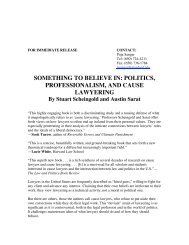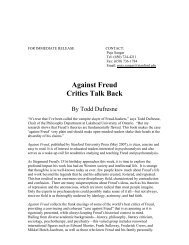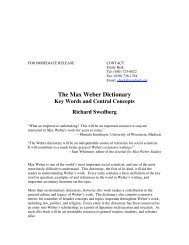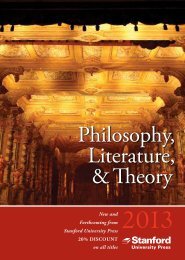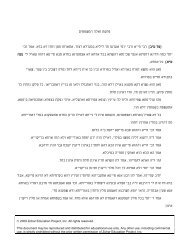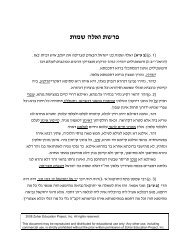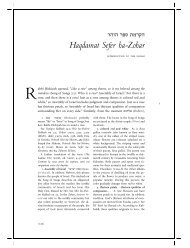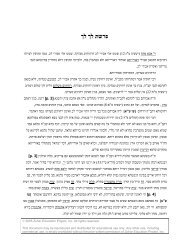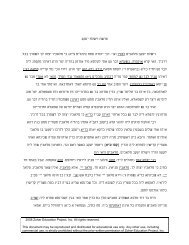Front Matter (PDF) - Stanford University Press
Front Matter (PDF) - Stanford University Press
Front Matter (PDF) - Stanford University Press
You also want an ePaper? Increase the reach of your titles
YUMPU automatically turns print PDFs into web optimized ePapers that Google loves.
of rebellingagainst Talmudic authority. But by this time (and in<br />
intention<br />
circles), the Zohar was beingread through the lenses of such radical<br />
these<br />
as the Ra'aya Meheimna, the ®fteenth-century Sefer ha-Qanah,<br />
interpreters<br />
anonymous work Galei Razayya, and the writings of Nathan of Gaza.<br />
the<br />
seen as the font of this literary tradition, the Zohar could be read as a<br />
When<br />
radical work indeed.<br />
very<br />
decline of Sabbateanism in the mid-eighteenth century preceded by<br />
The<br />
a few decades the beginning of the Enlightenment era in western Europe<br />
only<br />
the admission of Jews into a more open and religiously tolerant society. As<br />
and<br />
numbers of Jews became eager supporters of what they could only see as<br />
large<br />
readings of Judaism that supported or ®t this new situation<br />
emancipation,<br />
widespread. One feature of this emerging post-Enlightenment Judaism,<br />
became<br />
in its Reform or Orthodox versions, was either an open rejection or a<br />
whether<br />
settingaside of Kabbalah and the Zohar in particular. Scholem wrote an<br />
quiet<br />
about several obscure nineteenth-century ®gures whom he designated as<br />
essay<br />
Last Kabbalists in Germany.'' We have already spoken of Heinrich<br />
``The<br />
negative views of the Zohar, a position that was widely shared by his<br />
Graetz's<br />
While there were a few scholars in the period of the Wis-<br />
contemporaries.<br />
des Judentums (Adolph Jellinek of Vienna is the most notable) who<br />
senschaft<br />
the Zohar, it was mostly neglected by westernized Jews throughout the<br />
studied<br />
and early twentieth centuries.<br />
nineteenth<br />
eastern Europe, the situation was quite different. Hasidism, a popular<br />
In<br />
revival based on Kabbalah, continued to revere the Zohar and believe<br />
religious<br />
its antiquity. Several signi®cant Zohar commentaries were written within<br />
in<br />
circles, and the authors of Hasidic works often referred to the Zohar.<br />
Hasidic<br />
Pinḥas of Korzec, an early Hasidic master, was said to have thanked God<br />
Rabbi<br />
he was born after the appearance of the Zohar, ``for the Zohar kept me a<br />
that<br />
Hasidic legend has it that when the Zohar was published by his sons,<br />
Jew.''<br />
owned the printing-works in Slawuta, they dipped the press in the mikveh<br />
who<br />
bath) before printingeach volume, so great was the holy task that was<br />
(ritual<br />
to come before it! Hasidic masters, because of this legend, went out of<br />
about<br />
way to acquire copies of the Slawuta edition of the Zohar and to study<br />
their<br />
it. The great opponent of Hasidism, Rabbi Elijah (the ``Gaon'') of Vilna<br />
from<br />
was also a kabbalist, and a small group within the circle of his<br />
(1720±1797),<br />
continued the study of Zohar for several generations.<br />
disciples<br />
Sephardic and Mizraḥi Jews, the reputation of the Zohar as a<br />
Amongthe<br />
book was particularly strong. Jews in such far-¯ung communities as<br />
holy<br />
Turkey, and Iraq studied it avidly. Simple Jews recited the Zohar<br />
Morocco,<br />
in the way that uneducated eastern European Jews recited the Psalms.<br />
much<br />
in the eighteenth century, Jerusalem became known as a center of<br />
Beginning<br />
studies, and Jews from throughout these communities went there<br />
kabbalistic<br />
studied works that emanated from that center. Outside of Europe, it was<br />
and<br />
Introduction<br />
lxxv<br />
primarily the Lurianic Kabbalah that held sway, and the Zohar, while revered,



